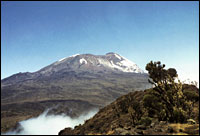How’s this for backwards messaging? A Forbes article posted late last week on MSNBC urges tourists to “See these travel spots – before it’s too late!“, referring to the world’s most endangered tourist destinations. These are exotic spots threatened by over-tourism, deforestation, and global warming, and as the article says, if they’re on your destination list, they may be gone before you can book your flight.

So wait a minute. The problem in some of these places is over-tourism — too many of us showing up, stomping around, touching stuff — so we’re supposed to rush out and flood the spots with even more tourists who want to be the last to see it? This “I got mine, screw the rest of y’all” school of thinking isn’t exactly the most environmentally sound. And the fact that global warming is responsible for the future disappearance of other spots makes it even more reprehensible. Encouraging everyone to jet off to exotic destinations in huge, carbon-spewing airplanes will only make the problem worse.
Spots in danger? The Galapagos Islands, Mount Kilimanjaro, the Kathmandu Valley in Nepal, ruins in Peru, the entire country of Tibet, the Everglades, the Great Barrier Reef.
I got all excited when I got to the bottom of the article, and they had a subhead titled “Taking action.” I thought they’d maybe tell people to be more responsible tourists, travel lightly and as little as possible, avoid air travel when you can, purchase offsets, or any of the plethora of things people can do to reduce their impact. Their proposed “action steps”?
The World Heritage Center tries to take corrective action when it feels a site is in jeopardy, says Rao. This could mean raising money to protect the area or diverting planned buildings or hotels to other places.
Still, man and Mother Nature are powerful forces. While some historic and natural sites might have a future, no amount of money or work can save other places, such as those affected by global warming, since it’s projected to worsen.
The point? Visit these places while they’re still around.
Oh, geez.

